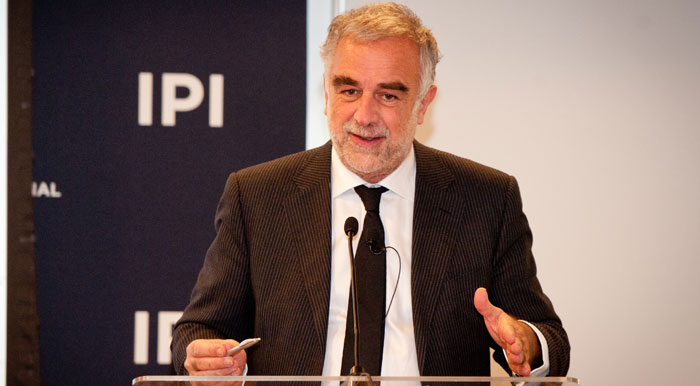
“I follow evidence. I’m a criminal prosecutor, I’m not a political analyst,” Luis Moreno-Ocampo, Chief Prosecutor of the International Criminal Court (ICC), told an IPI policy forum on January 20, 2012. Mr. Moreno-Ocampo was responding to a question about why the court prosecutes certain people and not others. “Maybe you don’t like it, but I will not prosecute people for political reasons.”
Mr. Moreno-Ocampo, who was elected as the ICC’s first prosecutor in 2003 and whose term ends in July, spoke widely about the evolving role of the ICC, its place in the global justice system, and particularly about the role of peace and justice, rejecting any claims that the ICC’s pursuit of cases hurts peace processes in conflict situations. “Contrary to public perception, the court’s intervention never destroyed a peace process,” he said. “On the contrary, the court intervention was used by negotiators to start a peace process.”
“The issue is who’s in charge of peace, who’s in charge of justice. How much these two dimensions are connected, how much this affects the prosecutor’s office. My point is, the Security Council is in charge of peace, the ICC is a new international institution doing justice.”
“Peace is not the responsibility of the prosecutor. The prosecutor has the responsibility to do justice, and judges will review in accordance with critical law,” he said. “Prosecutors cannot adjust to political considerations. We cannot decide that when the negotiator says ‘okay, now it is better to stop,’ I stop. I have no mandate to do that, and I will destroy the Office of the Prosecutor and the court if people perceive that the court is just adjusting to political considerations.”
Mr. Moreno-Ocampo said that even though standards of pursuing justice are different between countries who have signed the Rome Statue, and those who haven’t, “The rule is the same. The rule is no leader can commit atrocities to gain power or retain power.”
He said, “Committing atrocities is not a ticket for the cabinet, it’s a ticket for The Hague.”
“It’s not naiveté,” he said about prosecuting leaders involved in violence. “Naiveté is to think you can negotiate with a massive killer and then he will become a good, decent, democratic elected president.”
“The court is showing what is happening with the victims, which is normally ignored, but now can no longer be ignored and the court is showing how the state works [in committing crimes].”
In fact, he said, the “ICC is providing energy to the Security Council, now the Security Council has much more power than before, because sanctions are not a very great threat…now an arrest warrant is a great threat. So, in fact, we are providing this, and they are still learning how to do this.”
“The court is a little piece of a new global system, and there is some confusion that the court has to establish peace. In fact, if I try to adjust to political negotiations, I will destroy my office. I should not do that,” he said.
Moderating the event was Ambassador Abdullah Alsaidi, IPI Senior Adviser.
Interview with Luis Moreno-Ocampo, Chief Prosecutor of the International Criminal Court >>
Watch video of event:







